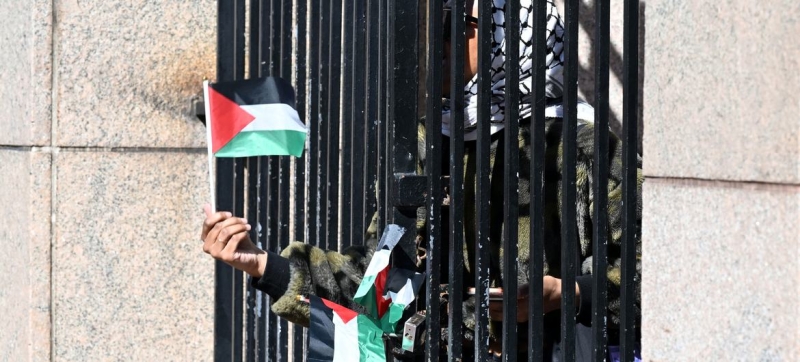
Protesters outside Columbia University in New York. UN expert concerned about suppression of pro-Palestinian protests at US universities Human Rights
Attacks on student protesters have been increasing recently in the United States, indicating “the erosion of intellectual freedom and democratic principles in educational institutions.” The UN Special Rapporteur on the right to education, Farida Shahid, warned about this on Friday.
“I am deeply concerned by the harsh suppression of peaceful demonstrations, arrests, detentions, police violence, surveillance and disciplinary measures and sanctions against members of the educational community exercising their rights to peaceful assembly and freedom of expression,” she said following an official visit to the United States.
A UN human rights expert said she was particularly alarmed by the unfair treatment of protesters, particularly pro-Palestinian demonstrators.
Commitment to Free Speech
While in the US, Shahid visited Washington DC, Indiana and Colorado. Her visit coincided with widespread protests in which American students camped on campuses to express solidarity with the Palestinians, call for a ceasefire in Gaza and, in many cases, demand that the university divest itself of any assets linked to Israel.
Shahid called on the US government to reaffirm its commitment to free speech by ensuring all students have unrestricted access to a diversity of ideas and viewpoints.
Read also:
Main UN human rights activist concerned about crackdown on protests at US universities
“These attacks signal a worrying erosion of intellectual freedom and democratic principles in educational institutions,” – she noted.
Systemic problems
The human rights activist also expressed concern about 307 educational bills and initiatives in the field ban on the dissemination of information that appeared in the United States from January 2021.
“These policies, through book bans and curriculum restrictions, have created a pervasive ‘chilling effect’ that stifles the free exchange of ideas and silences marginalized voices,” she said.
Shahid concluded that underfunding in the U.S. education system has paved the way for other systemic problems, including teacher shortages and difficulties supporting student mental health. Inequity in education funding is exacerbated by an overreliance on local property taxes, which impacts low-income neighborhoods.
“Communities must find a way to distribute equitably funds between richer and poorer areas to break the vicious circle of deprivation and segregation,” Shahid emphasized.
“I also call on the federal government to take decisive action to address inequalities in education funding,” she added.
Expanding Education Rights
The Special Rapporteur called on federal and state authorities to recognize education as a human right, ensuring equitable access to it for all students, regardless of background, income, location or any other personal circumstances.
Shahid also noted that despite federal guarantees of non-discrimination, unsafe conditions and police presence in schools, standardized testing and mental health issues more negatively impact people from marginalized and minority communities.
“It is critical to eliminate police presence in schools and invest in qualified staff, including psychologists and social workers, to create a safe and supportive learning environment,” she stressed.
It’s time to prioritize holistic development and social skills over standardized testing scores, expert says.
Special Speakers include composition of the “Special Procedures” of the UN Human Rights Council. They are not UN staff and are independent of any government or organization. They serve in an individual capacity and are not paid for their work.
